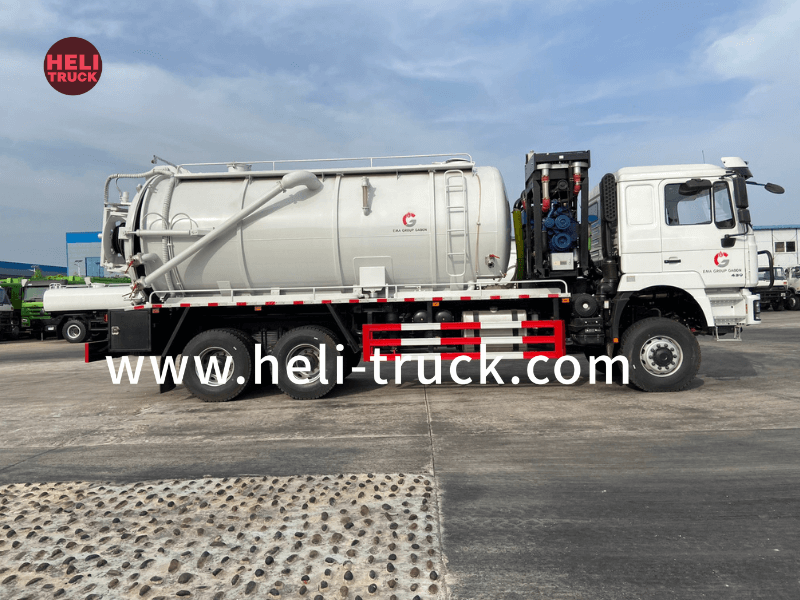Introduction
Waste management is a critical issue in modern society, with increasing urbanization and population growth leading to higher levels of waste generation. Garbage compactor trucks play a vital role in the collection and transportation of waste from residential, commercial, and industrial areas to disposal sites. These trucks are equipped with compactors that compress the waste, allowing for more efficient transportation and disposal. In recent years, advancements in technology have led to the development of garbage compactor trucks with advanced monitoring systems, revolutionizing the way waste is managed and improving operational efficiency. This article explores the role of garbage compactor trucks with advanced monitoring systems in waste management and their benefits for both the environment and public health.
Evolution of Garbage Compactor Trucks
Garbage compactor trucks have been an essential tool in waste management for decades. The first compactor trucks were introduced in the early 20th century and consisted of basic vehicles with manual loading and compacting mechanisms. Over time, advances in technology led to the development of hydraulic compactors, which significantly improved the efficiency of waste collection and transportation. These hydraulic compactors allowed for the automatic compression of waste, reducing the volume and increasing the payload capacity of the trucks.

In recent years, garbage compactor trucks have undergone further advancements with the integration of advanced monitoring systems. These systems utilize sensors, cameras, and telematics technology to provide real-time data on the status of the compactor truck, the amount of waste collected, and the route taken during collection. This real-time monitoring allows waste management companies to optimize their collection routes, reduce operational costs, and improve overall efficiency.
Benefits of Advanced Monitoring Systems in Garbage Compactor Trucks
The integration of advanced monitoring systems in garbage compactor trucks offers a wide range of benefits for waste management companies, municipalities, and the environment. Some of the key benefits include:
1. Improved Operational Efficiency: Advanced monitoring systems provide real-time data on the status of the compactor truck, allowing operators to track the location of the vehicle, monitor the amount of waste collected, and optimize collection routes. This real-time information helps to streamline operations, reduce downtime, and improve overall efficiency.
2. Enhanced Safety: The use of cameras and sensors in garbage compactor trucks helps to improve safety during waste collection. Operators can monitor the surrounding environment, detect obstacles or hazards, and ensure that the compactor truck operates smoothly and safely.
3. Reduced Environmental Impact: By optimizing collection routes and reducing fuel consumption, garbage compactor trucks with advanced monitoring systems help to minimize their environmental footprint. Additionally, the use of compaction technology reduces the volume of waste, leading to fewer trips to disposal sites and lower emissions.
4. Data-Driven Decision Making: Advanced monitoring systems provide valuable data on waste generation patterns, collection frequencies, and operational costs. This data can be used to make informed decisions on resource allocation, route optimization, and service improvements, leading to more effective waste management practices.
Case Studies: Successful Implementation of Advanced Monitoring Systems
Several waste management companies and municipalities have successfully implemented garbage compactor trucks with advanced monitoring systems, showcasing the benefits of these technologies in practice. One such case study is the city of Singapore, which has a highly efficient waste management system that relies on advanced monitoring and automation.
In Singapore, garbage compactor trucks are equipped with sensors and GPS tracking systems that provide real-time data on waste collection activities. By analyzing this data, waste management companies can optimize collection routes, reduce fuel consumption, and improve operational efficiency. The use of advanced monitoring systems has helped Singapore achieve high rates of waste recycling and diversion from landfills, making it a global leader in sustainable waste management practices.
Another successful case study is the city of San Francisco in the United States, which has implemented a comprehensive waste management program that includes the use of garbage compactor trucks with advanced monitoring systems. By leveraging real-time data on waste collection activities, San Francisco has been able to increase recycling rates, reduce landfill waste, and achieve cost savings through improved operational efficiency.
Challenges and Future Trends
While garbage compactor trucks with advanced monitoring systems offer numerous benefits for waste management, there are also challenges and limitations to consider. Some of the key challenges include the high upfront costs of implementing these technologies, the need for specialized training for operators, and potential privacy concerns related to data collection and monitoring.
Despite these challenges, the future of waste management is increasingly reliant on advanced monitoring systems and technology. As urban populations continue to grow, waste generation rates rise, and environmental concerns become more prominent, the need for innovative and efficient waste management solutions will only increase. Garbage compactor trucks with advanced monitoring systems are poised to play a central role in meeting these challenges and driving sustainable waste management practices in the years to come.
Road sweeper truck maintenance with advanced monitoring systems represent a significant advancement in waste management technology, offering a wide range of benefits for waste management companies, municipalities, and the environment. By providing real-time data on waste collection activities, optimizing collection routes, and reducing the environmental impact of waste transportation, these technologies are revolutionizing the way waste is managed and improving operational efficiency.
As the global population continues to urbanize and waste generation rates rise, the role of garbage compactor trucks with advanced monitoring systems will become increasingly important in driving sustainable waste management practices. By leveraging the power of technology and data-driven decision-making, waste management companies can enhance safety, efficiency, and environmental sustainability in their operations, ultimately leading to a cleaner and healthier future for all.
In conclusion, garbage compactor trucks with advanced monitoring systems are a key tool in the ongoing effort to tackle the challenges of waste management and build a more sustainable future for generations to come.
